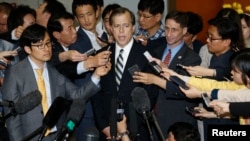North Korea’s announcement expressing willingness to negotiate with the United States on denuclearization is a positive step but one that needs to be dealt with cautiously, say former U.S. officials who have dealt extensively with North Korea.
On Monday, North Korea’s leader, Kim Jong Un, told a South Korean delegation visiting Pyongyang that he is willing to a “hold a heartfelt dialogue” to begin negotiations with the U.S. on denuclearization.
“It’s certainly a positive development if such talks get scheduled…I do hope that it moves forward,” Ambassador Wendy Sherman told VOA.
“If all comments are accurate and North Korea says it will stop testing as these conversations move forward, this, of course, would be a positive sign,” said Sherman, who served as North Korea policy coordinator during the Clinton administration and most recently as undersecretary of state for political affairs during the Obama administration.
The U.S. needs to proceed to talks and to not “be perceived as missing an opportunity” to talk to North Korea, according to Christopher Hill who led the U.S. delegation to nuclear talks with North Korea during the George W. Bush administration.
Robert Manning, a senior fellow at the Atlantic Council, also believes North Korea’s willingness to talk is a positive development and “exactly what the Trump administration had been asking for.”
In response to Kim, President Donald Trump tweeted on Tuesday “possible progress being made in talks with North Korea” and added that the U.S. is ready to deal with North Korea whether or not it is sincere about denuclearization, “May be false hope, but the U.S. is ready to go hard in either direction!”
South Korean envoys
The latest development came after Kim sent his sister, Kim Yo Jong, to the opening ceremony of the PyeongChang Winter Olympics to propose a summit meeting between the two Koreas to South Korean President Moon Jae-in. Moon had initiated a peace effort to reduce tensions on the Korean Peninsula after North Korea conducted multiple rounds of nuclear weapons and missile tests last year.
The two day-trip to Pyongyang was led by South Korean envoys including National Security Adviser Chung Eui-yong and National Intelligence Service Chief Suh Hoon.
Kim told the South Korean envoys that he would suspend all nuclear weapons and missile tests while having such talks, if the U.S. removed what North Korea considers threats to its regime.
The trip ended on Tuesday with an agreement for the leaders of the two Koreas to meet in Panmunjom, a truce village in the demilitarized zone between the two countries, in late April. The South Korean envoys are expected to give an official briefing to the Trump administration in Washington later this week.
“North Korea has long believed the United States is an existential threat to the survival of the regime,” Sherman told VOA.
If the U.S. agrees to talk to North Korea, she cautioned that Washington needs to stay in close communication with South Korea because “North Korea is quiet adept at trying to drive a wedge, particularly between [the U.S.] and South Korea.
Hill cautioned, “You have to remember nuclear weapons for [Kim] is not about regime survival … It’s about decoupling the U.S. from South Korea. That’s the aim.”
“One has to be a little skeptical about North Korea’s public pronouncements,” he added.
Denuclearization
According to Evans Revere, who served as an acting assistant secretary of state of East Asian and Pacific Affairs and has extensive experience negotiating with North Korea, Kim’s regime has a tendency to interpret “denuclearization of the whole Korean Peninsula” to mean the removal of the U.S. nuclear umbrella in South Korea.
But North Korea also feels threatened by the presence of U.S. troops in South Korea and the existence of the U.S.-South Korean security treaty, and it would only feel secure and in a position to consider denuclearization if all were removed, according to Revere.
Manning thinks the U.S. should “test” North Korea to see “if they are serious” about being willing to discuss giving up their nuclear weapons program. He suggested the U.S. should dispatch a high-level envoy who “can present an unfiltered message to Kim Jong Un for an exploratory meeting.”
The Trump administration has said repeatedly that denuclearization is its main policy objective toward the Kim regime.
“I don’t think anyone who knows the situation well thinks it is a good idea to accept a nuclear North Korea,” Hill said. “I think the Trump administration will hold to the idea of denuclearization of North Korea. I think that’s firm.”
“The question is whether the Trump administration has the flexibility and the agility to respond to this in a way that the South Koreans and others will regard it as a positive response,” said Hill.
Manning, who thinks the Trump administration does not have a clear diplomatic strategy, suggests the U.S. should resume the Six-Party Talks starting with the September 2005 Agreed Statement.
According to the Arms Control Association, “The six-party talks were a series of multilateral negotiations held intermittently since 2003 and attended by China, Japan, North Korea, Russia, South Korea, and the United States for the purpose of dismantling North Korea’s nuclear program. The talks were hosted in Beijing and chaired by China. North Korea decided to no longer participate in the six party process in 2009. In subsequent years, other participants, notably China, have called periodically for a resumption of the process.”
The statement set forth offers including energy aid, economic assistance, U.S.-North Korea normalization, security guarantees, and a peace treaty amenable to North Korea. According to the statement, “The Six Parties agreed to take coordinated steps to implement the aforementioned consensus in a phased manner in line with the principle of ‘commitment for commitment, action for action’” as North Korea makes progress on denuclearization.
Youngnam Kim from VOA Korean Service and Ira Mellman from VOA contributed to this story.










